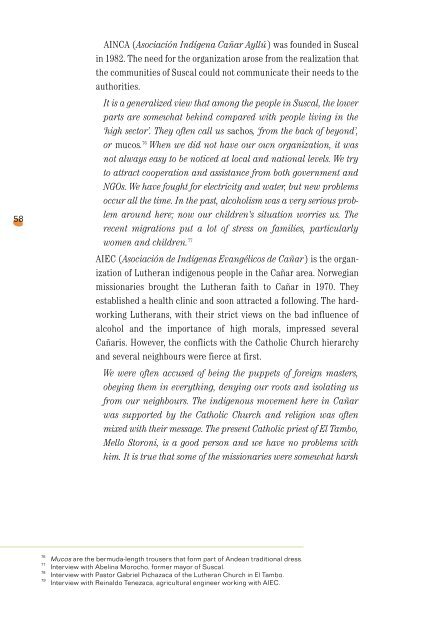mishqui-yacu, sweet water - IFAD
mishqui-yacu, sweet water - IFAD
mishqui-yacu, sweet water - IFAD
Create successful ePaper yourself
Turn your PDF publications into a flip-book with our unique Google optimized e-Paper software.
58<br />
AINCA (Asociación Indígena Cañar Ayllú) was founded in Suscal<br />
in 1982. The need for the organization arose from the realization that<br />
the communities of Suscal could not communicate their needs to the<br />
authorities.<br />
It is a generalized view that among the people in Suscal, the lower<br />
parts are somewhat behind compared with people living in the<br />
‘high sector’. They often call us sachos, ‘from the back of beyond’,<br />
or mucos. 76 When we did not have our own organization, it was<br />
not always easy to be noticed at local and national levels. We try<br />
to attract cooperation and assistance from both government and<br />
NGOs. We have fought for electricity and <strong>water</strong>, but new problems<br />
occur all the time. In the past, alcoholism was a very serious problem<br />
around here; now our children's situation worries us. The<br />
recent migrations put a lot of stress on families, particularly<br />
women and children. 77<br />
AIEC (Asociación de Indígenas Evangélicos de Cañar) is the organization<br />
of Lutheran indigenous people in the Cañar area. Norwegian<br />
missionaries brought the Lutheran faith to Cañar in 1970. They<br />
established a health clinic and soon attracted a following. The hardworking<br />
Lutherans, with their strict views on the bad influence of<br />
alcohol and the importance of high morals, impressed several<br />
Cañaris. However, the conflicts with the Catholic Church hierarchy<br />
and several neighbours were fierce at first.<br />
We were often accused of being the puppets of foreign masters,<br />
obeying them in everything, denying our roots and isolating us<br />
from our neighbours. The indigenous movement here in Cañar<br />
was supported by the Catholic Church and religion was often<br />
mixed with their message. The present Catholic priest of El Tambo,<br />
Mello Storoni, is a good person and we have no problems with<br />
him. It is true that some of the missionaries were somewhat harsh<br />
76<br />
77<br />
78<br />
79<br />
Mucos are the bermuda-length trousers that form part of Andean traditional dress.<br />
Interview with Abelina Morocho, former mayor of Suscal.<br />
Interview with Pastor Gabriel Pichazaca of the Lutheran Church in El Tambo.<br />
Interview with Reinaldo Tenezaca, agricultural engineer working with AIEC.
















